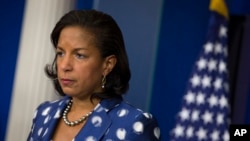U.S. President Donald Trump is suggesting that Susan Rice, the national security adviser for his predecessor, former President Barack Obama, spied on conversations Trump aides had with foreign nationals last year and sought to unmask their identities for political gain, an allegation Rice said Tuesday was "absolutely false."
Rice, in an interview with MSNBC, said there is no truth to Trump's claim a month ago that Obama wiretapped him, an allegation also widely debunked by U.S. lawmakers and intelligence officials. But Trump, in a string of Twitter comments the last two days, has approvingly cited news accounts alleging that Rice "ordered spy docs on Trump."
Rice said that in her key White House posting she reviewed U.S. intelligence reports on a daily basis. She added it was "not uncommon" for her to ask intelligence gatherers to reveal the name of a U.S. individual captured as talking with foreign agents during routine surveillance.
She said the same information was then provided to country's secretary of state, defense secretary and director of national intelligence as part of their jobs to protect U.S. national security.
Rice said none of the information was used in any political context against the Trump campaign in his run for the White House last year. She denied one U.S. media account that she had compiled "a spreadsheet" of the names of Trump officials purportedly captured by the eavesdropping. Rice said "nothing of the sort" existed, but that it was "possible" that some Trump aides were picked up as part of the "incidental collection" of the eavesdropping.
Some lawmakers have called for Rice to testify before congressional panels investigating Russian meddling in the U.S. election in an effort to help Trump win, but Rice, in the interview, declined to commit to her testifying.
White House spokesman Sean Spicer said he would not weigh in on who should testify. But he said of Rice, "I do think there is a sharp contrast between a few weeks when she was very public in saying she quote ‘had nothing, didn’t have any clue" about surveillance reports... And yet now we’re finding out that you know, she is trying to figure out how she can go through some kind of friendly way of-of discussing this.”
In one tweet Monday, Trump said, "There was electronic surveillance of Trump, and people close to Trump. This is unprecedented."
Trump has not produced any evidence to support his wiretapping claim, and recently has said that his allegation was meant to refer more broadly to Obama-era surveillance of him and his aides during the long presidential campaign that culminated in his unexpected victory in last November's election.
Officials familiar with U.S. national security operations say that as the country's national security adviser, Rice had the legal authority to monitor routine U.S. eavesdropping of foreign officials' calls with Americans. But the names of Americans involved in the calls cannot be legally disclosed and none have been, other than that of another former national security adviser, retired U.S. Army General Michael Flynn.
Trump ousted Flynn in February after just 24 days on the job when eavesdropping showed that Flynn lied to Vice President Mike Pence and others about his contacts with the Russian ambassador to Washington in the weeks before Trump assumed power.
The U.S. intelligence community concluded earlier this year that Russia meddled in the U.S. election in an effort to help Trump defeat his Democratic challenger, former U.S. Secretary of State Hillary Clinton. Now, the country's top law enforcement agency, the Federal Bureau of Investigation, is probing whether Trump aides criminally colluded with Russian agents to boost Trump's chances of winning.
In addition, the intelligence committees in both the Senate and the House of Representatives are conducting investigations about the Russian interference in the election and contacts between Trump campaign officials and Russian agents.




